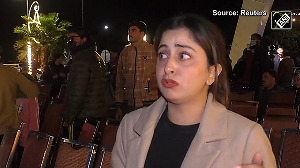Former International Cricket Council chief Malcolm Speed fears Mumbai would not be a favourite venue for foreign teams after the recent terror attacks, which could also have a "large impact" on India staging cricket series and revenues earned from them.
"It would be very disappointing if the tragedy in Mumbai caused teams not to visit India, and India's passionate fans were deprived of great contests. Pakistan faces the same problem... Clearly, Mumbai will be off limits for some time," Speed said.
"Cricket is played in countries that are increasingly dangerous... If India is off limits for some teams for some time, it will impact on the revenues of the BCCI [Board of Control for Cricket in India]," he was quoted as saying by the Sydney Morning Herald.
The former ICC CEO, however, said he would like cricket to be a part of the healing process in India after the attacks in Mumbai.
"It is clear these dreadful attacks will have a large impact on cricket in India. It would be great if cricket could be part of the healing process.
"At a time of such tragedy, it is difficult to focus on sport. Several cricket people were caught up in the attacks, and it's a relief that they escaped largely unharmed.
"Sport has the power to bring nations together. Some of the discussions between the Indian Prime Minister and Pakistan's President over peace in Kashmir took place at cricket matches," he said.
Speed, who had once criticised the BCCI for just being a financial power without much result on the field, change his stance as India was "emerging as a world leader".
"Much of the media commentary about India's position in cricket focuses on money and India's financial and decision-making clout. Little credit has been given to the BCCI administrators who have been able to take advantage of this," Speed said.
"Good governance produces good cricket teams, and India's team is emerging as a world leader," he added.
Joining debate on whether Twenty20 cricket is a boon or a bane, Speed said it is a unique opportunity for the sport to grow.
"I see Twenty20 as a huge opportunity rather than a threat for cricket. No other sport has been presented with the opportunity to grow a popular and contemporary third form of its game," said Speed when asked if ODIs are under threat.
He felt the chaos in the international calendar is just a part of the teething problems posed by T20.
"I expect that the current concern about Twenty20 and its impact on scheduling will settle down in the next two to three years, and each form of the game will find its place.
"When I started at Cricket Australia in 1997, the cat-cry of many journalists was Test cricket was dying because of 50-over cricket. The past 11 years have seen some great Test cricket. All sports move in cycles of popularity," he said.
About the biggest challenges facing the game, Speed scrolled down a list of issues including security.
"Finding the correct balance between Tests, ODIs and T20. The challenges that flow from playing the top level of cricket in dangerous countries at a time when the world is going through a very unstable and dangerous period.
"The ongoing saga of Zimbabwe. Bangladesh's inability to move forward as a major cricket country. Ensuring that cricket remains committed to fighting corruption in the game at a time when there is more money than ever before flowing into the sport," he said.







 © 2025
© 2025